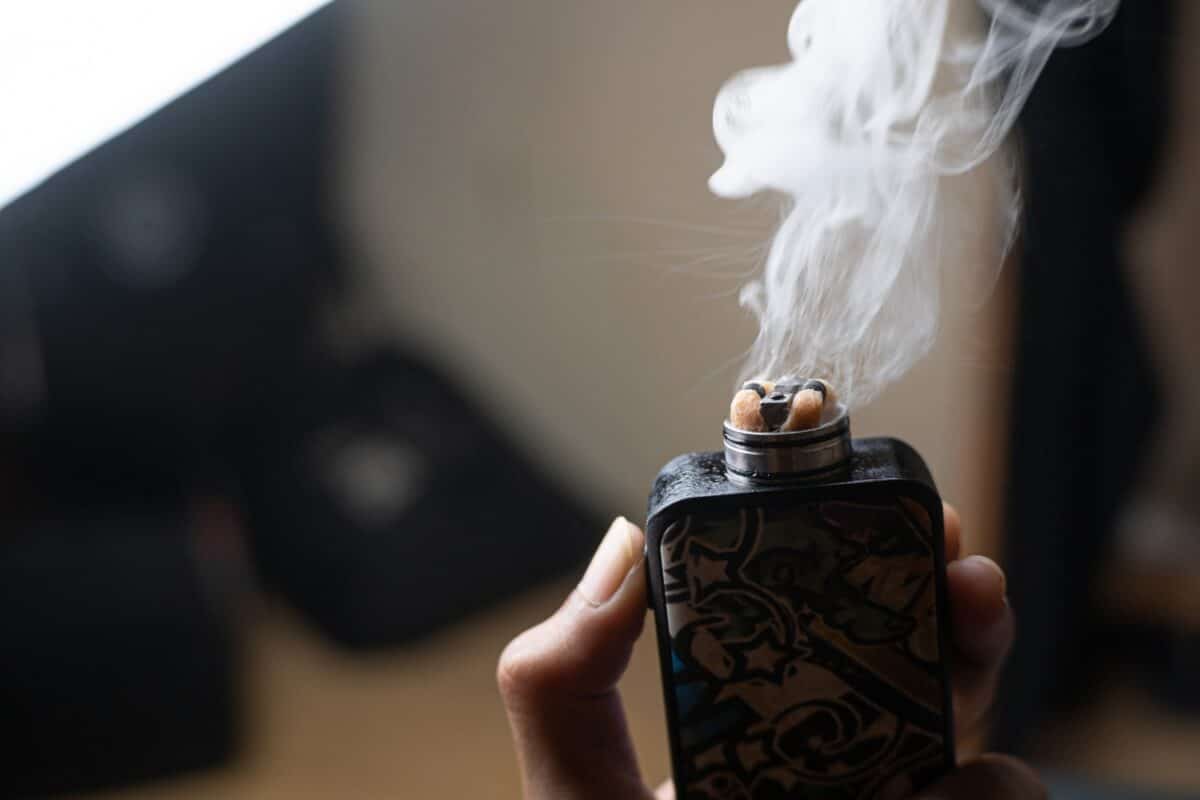The vaping trend has increased rapidly in recent years, with many people turning to evaporated liquids instead of smoking cigarettes, which are littered with various toxins such as rocket fuel, rat poison, and carbon monoxide.
But are these flavoursome puffs of mist better for our health than traditional cigarettes, or are there hidden dangers lurking beneath the glitz and glamour of clever brand marketing, an ever-evolving selection of dazzling flavours, and colourful packaging?
Studies show that over 2.5 million young people reported e-cigarette use in 2022.
These statistics are concerning, to say the least, as vaping has been known to be a gateway into tobacco smoking, where vapers eventually graduate to cigarettes.
The Centres for Disease Control and Prevention (CDC) explains that with such a vast selection of vaping appliances out there, including disposable devices, flavoured products and a wide range of different brands, the health of our Nation’s youth is under threat. (Centres for Disease Control and Prevention (CDC), October 6, 2022.)
This article explores the five hidden dangers of vaping.
In the meantime, if you are concerned about your (or a loved one’s) vaping habits, it may be time to speak to a healthcare professional or therapist for advice and support.
How we can help
White River Manor provides personalised addiction and mental health treatment programs to clients in South Africa and surrounding regions.
Utilising a “whole” person approach, our clinical team use various treatment approaches and modalities to ensure you get the most out of your recovery, helping you to identify and manage your triggers and urges and live a life free from substances.
To learn more about our mental health and addiction treatment programs, contact our friendly team in South Africa today, who will happily provide further help and support.
Although vaping isn’t as addictive as cigarettes, it can still cause issues with dependency and profound cravings due to the nicotine present in many vaping products.
Even e-liquids that claim they are nicotine-free have been found to have some traces of nicotine, a highly addictive substance found in cigarettes.
So, if you think your vaping habits are becoming an issue, speaking to a healthcare professional is one way to get your life back under control and either cut down or quit vaping for good.
What is vaping?

Vaping primarily involves breathing in aerosol produced by heating a liquid (vape juice or e-liquid).
Those who vape often use electronic apparatus such as vaporisers or e-cigarettes, which contain a range of different additives, including various flavourings, nicotine and other ingredients.
Once the device warms up the liquid, this creates a vapour that an individual inhales, similar to how cigarettes are consumed, but without all the toxins such as tobacco.
If you know someone who vapes, you’ll probably be familiar with the bubbling sound as they inhale, often followed by a large puff of mist that produces a fruity scent on exhale.
Although researchers report that vaping is less dangerous than smoking, it is still not entirely safe.
So, what are the risks associated with vaping?
Let’s take a look.
The five hidden dangers of vaping
Because it’s still a relatively new trend, more research is yet to be done on the effects of vaping and the lasting impact it can have on our physical health and well-being.
However, the current research shows there are various potential risks associated with vaping, five of which are listed below.
1. Nicotine addiction
As mentioned, many vaping devices and products contain nicotine, even those that say they don’t still have minimal traces.
Nicotine is a highly addictive substance and can lead to addiction and dependency, especially among the younger generation.
Researchers say that although e-cigarettes do not have tobacco in them, they do contain nicotine, which comes from tobacco.
Because of this, the Food and Drug Administration (FDA) has labelled e-cigarettes as a “tobacco product.”
Due to the potential risk for dependency, vapers must exercise caution when using e-cigarettes and other vaping devices.
Worryingly, popular culture hasn’t entirely caught up with the various risks involved with vaping with more and more young people developing the habit in recent years.
2. Respiratory issues

Various studies have shown the harmful effects of vaping on the respiratory system, causing multiple respiratory issues, including:
- Bronchitis
- Lung inflammation
- Popcorn lung (bronchiolitis obliterans)
Popcorn lung has become a popular term due to its rising prevalence rates among those who vape.
The chemical diacetyl, found in many food products such as flavoured beverages like coffee, popcorn, and fruity drinks has been deemed safe to consume. Still, when inhaled, it can be detrimental.
The research shows that although many food companies have removed this chemical from their products, diacetyl can still be found in various e-cigarette flavours, which has led to many instances of popcorn lung within the vaping community.
Symptoms of popcorn lung may include:
- Fatigue or unexplained tiredness
- Flu-like symptoms (including fever)
- Chest wheezing
- Weight loss
If you think you have any of the above symptoms and vape regularly, it might be time to speak to your doctor or GP for a thorough health check to be on the safe side.
3. Cardiovascular issues
As well as the respiratory health risks, vaping has also been known to cause cardiovascular issues among users.
This is because the nicotine and other additives in vaping products can increase your blood pressure and heart rate, which may lead to cardiovascular issues in the long term.
For example, one study found that those who vape and those who smoke cigarettes experienced more significant increases in heart rate compared to those who do not vape or smoke tobacco.
The vapers and cigarette smokers in the study experienced approximately a four beats per minute increase in heart rate after vaping or smoking.
On the other hand, study participants who reported no nicotine experienced no changes in heart rate. (American Heart Association Scientific Sessions 2022.)
4. Issues with brain development

Some studies have found that vaping can have a long-term impact on brain development.
This can cause various issues for our youth as more and more young people are turning to vaping products now more than ever.
For instance, research shows that around 10% of girls aged 11-15 use vaping products compared to 7% of boys.
Since adolescence is such a crucial time for brain development, these statistics are profoundly worrying as researchers report that nicotine can harm the developing brain and cause addiction and dependency among young people.
5. Unknown long-term impact
Perhaps one of the most daunting aspects is the unknown long-term implications of vaping.
Because vaping is still a relatively new trend, the long-term health effects are not fully known or understood.
There may be unforeseen risks that emerge with chronic use.
However, because we are still learning about the impact of vaping and research is continually evolving, it’s difficult to say what the lasting implications associated with prolonged vaping might be.
A brief history of South Africa’s vaping culture
Although many may think vaping is a relatively new phenomenon, it’s actually been around for some time.
For instance, the vaping trend in South Africa first began in the early 2000s when electronic cigarettes first emerged in the Country.
Of course, the vaping devices used back then were not as advanced as today.
Still, in those days, many South Africans used vaping apparatus as a smoking cessation tool to help them quit cigarettes.
According to the research, vaping devices became more advanced around 2010.
Because of this, South Africa’s vaping culture evolved, as did the growing range of e-liquids and vape juices that many enjoy today.
The bottom line

The idea that vaping is a much safer substitute for smoking is gradually being quashed as reports of severe lung complications are on the rise due to prolonged use.
Prevention is better than cure, and one of the ways to prevent health complications is to stop vaping altogether.
With its sleek packaging, tasty flavours, and cultural appeal, vaping, particularly among younger people, gives the illusion that this alternative to smoking is not only safe but that it is cool.
However, the fruity mist many have come to enjoy contains chemicals that have sparked various health concerns within the medical community.
If you are concerned about your vaping habits, you should seek the help of a professional to help you overcome your dependency, allowing you to regain control over your health and life.
At White River Manor, our world-class multidisciplinary team, with their extensive knowledge and experience, is dedicated to helping you on your journey to wellness and transformation.
We provide personalised addiction and mental health treatment programs, including dependency programs, cognitive behavioural therapy, and dual diagnosis treatment, as well as a comprehensive aftercare program to ensure you get the most out of your recovery.
Reach out to our friendly team today for more information about our treatment programs.
Start your journey towards lasting wellness and transformation feeling hopeful and inspired about the positive changes ahead.
Rest assured, we are not just a treatment provider but a supportive companion, ready to guide you every step of the way, making you feel understood and not alone in your journey towards wellness.







